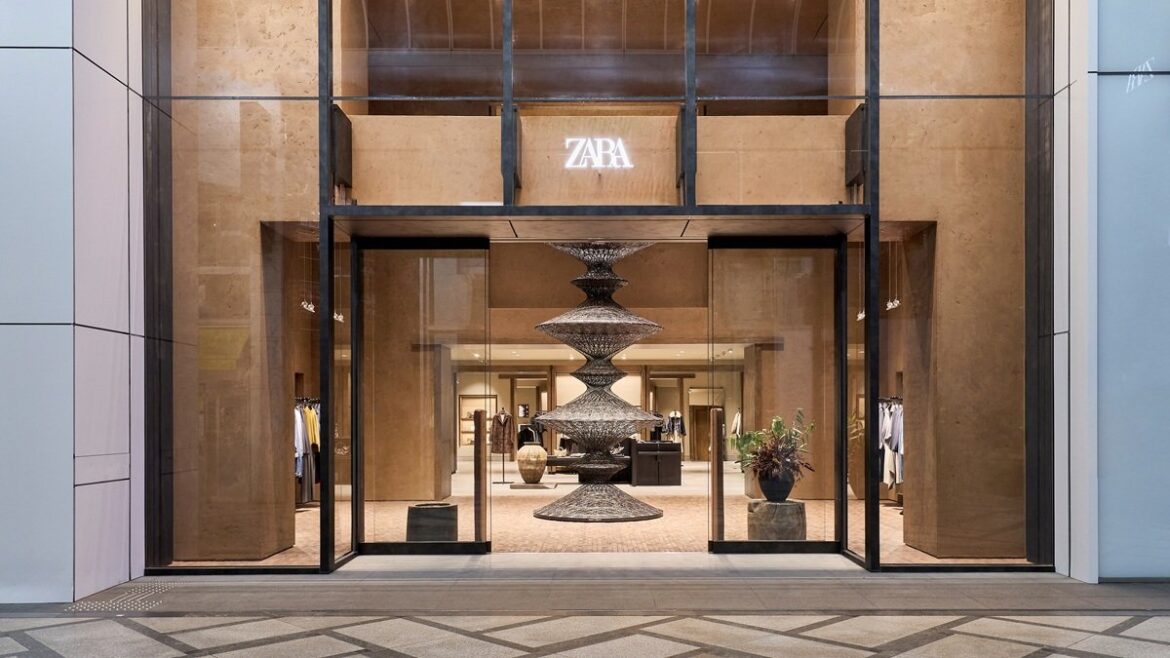Zara is extending its commercial network in Asia with a flagship store in the Japanese market, marking a new milestone in the year of the chain’s 50th anniversary celebration. Inditex’s leading brand has raised the shutter on a 20,400-square-feet flagship store in the Shinsaibashi district of Osaka, which incorporates Japan’s first Zacaffè, a proprietary coffee shop concept that combines design, hospitality and culture that the brand debuted a year ago in Madrid.
Asia is one of the most important markets for the group headed by Marta Ortega, behind Europe and America. With a slight decline of 0.16%, sales in Asia and the rest of the world stood at €6.06 billion in the last fiscal year, compared to €6.07 billion in 2023. The region then reduced its weight in total group sales from 16.9% to 15.7%, reflecting a slight slowdown in the Asian business, offset by solid growth in the European market.
Designed by Zara’s in-house architecture studio, the store is distributed over four floors and pays homage to Japanese architectural tradition through vernacular materials such as tatami, adobe and noren, combined with metallic finishes in black steel and hammered metal. The result is a space that blends history and modernity, reflecting the brand’s new global identity.
The Zacaffè, the centerpiece of the project, is the second in the global network after the format’s debut last year at Zara Man in Hermosilla, in the Spanish capital. In Osaka, the space is conceived as a meeting point that transcends the shopping experience, with furniture in Nara wood, natural cobblestone flooring and exclusively designed tableware.
Zara has opened a 20,400-square-feet flagship store in Shinsaibashi, Osaka
According to the brand, the concept seeks to create a cultural link with each city where it is installed. In Japan, the Zacaffè reinterprets the balance between calm and energy characteristic of the country and reaffirms Zara’s commitment to integrate lifestyle, architecture and retail, a strategy closely linked to the chain’s roadmap towards a premium model with high and sophisticated positioning.
At the beginning of 2025, the European Union Intellectual Property Office (Euipo) accepted the opposition filed by the Italian company Zicaffè against the registration of the Zacaffè trademark. The company, dedicated to the roasting and sale of coffee since 2010, alleged “risk of confusion for the public” and “undue advantage of the reputation” of its trademark.
Despite this obstacle, Inditex has maintained its original roadmap, which contemplates the expansion of the Zacaffè concept in Asian markets such as South Korea, where the company considers that this type of experiential formats are well received.
Like the new Zara stores, the recently opened store in the Japanese market incorporates the group’s latest technological innovations, with assisted checkout areas, two-hour online order collection points and automated counters for returns.
Inditex’s largest retailer now operates 64 stores in the Japanese market
Zara arrived in Japan in 1998 with the opening of its first store in Shibuya, Tokyo. Since then, the brand has consolidated a network of 64 stores in the country. The Osaka opening reinforces its positioning in the Asian market, where the company is moving forward with its strategy of large stores in premium locations and an increasingly immersive experience.
The opening project coincides with the 50th anniversary of the founding of Zara in A Coruña, in 1975, and is part of a global offensive that combines openings in strategic locations and projects to raise the perception of the chain. Zara has recently expanded its international network with a new flagships in the United States, a three-story space at Caesars Palace in Las Vegas. Before the end of the year, in the U.S. market, the group plans new openings in Costa Mesa, Austin, Boston and Charlotte, and has already signed recent openings in Brea Mall, The Grove (California) and Cambridge (Massachusetts).
In Spain, the company has reopened its store at 23 Serrano Street in Madrid, transformed into an The Apartamento format, which combines fashion, home and experiences. Conceived by Elsa Urquijo Arquitectos, the project reinforces Zara’s premium positioning and is the third Apartamento in the network after those in A Coruña and Paris. In addition, the top floor of the store includes a cafeteria in collaboration with Balbisiana. This space, however, is not part of the Zacaffè concept.
In terms of results, the Spanish group Inditex closed the first quarter with a 1.5% increase in sales, to €8.27 billion, and a 0.3% increase in net profit, which stood at €1.30 billion. The evolution marked a more moderate pace than in the same period of 2024, when the company increased its sales by 7.5% and its net profit by 9%.


AloJapan.com